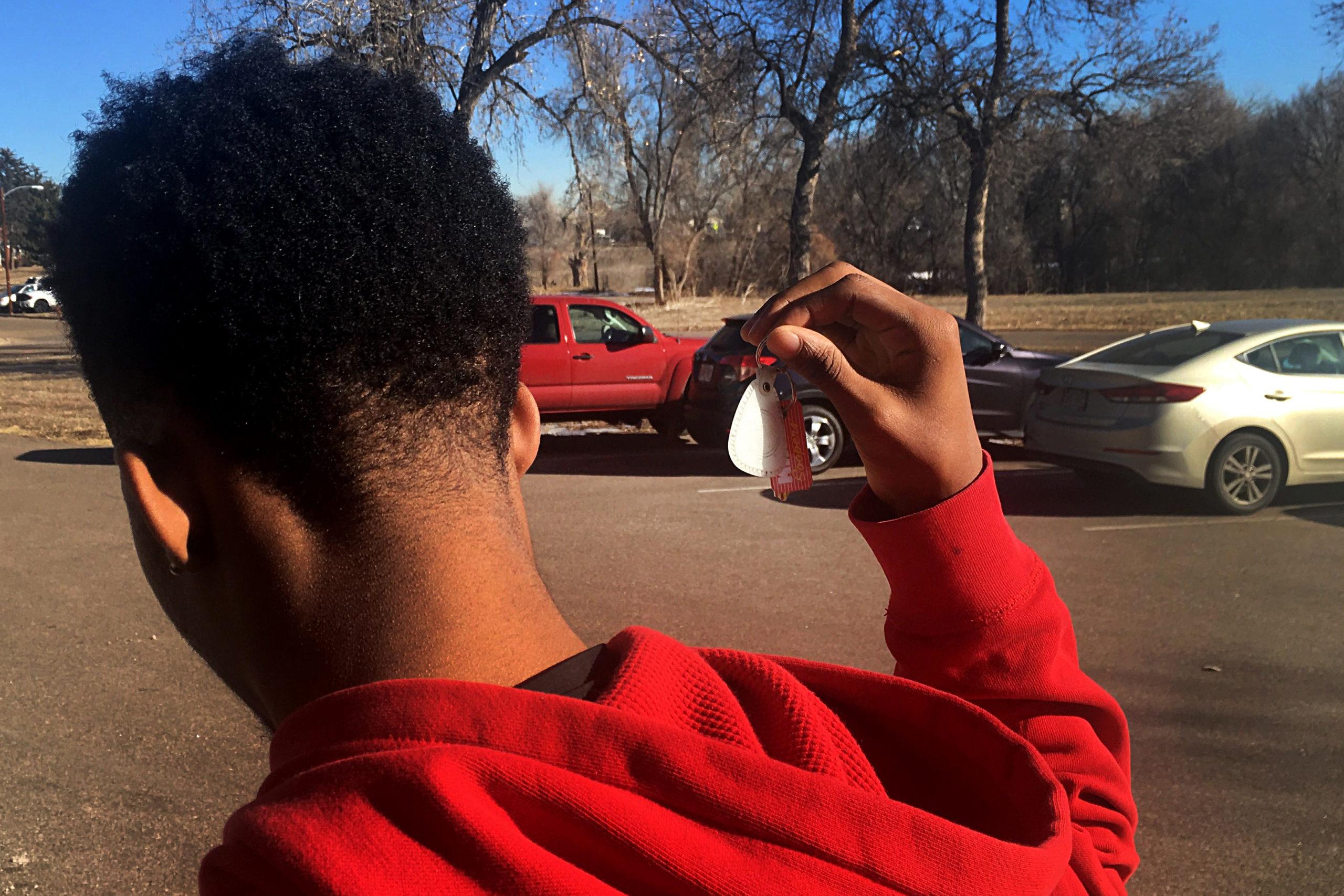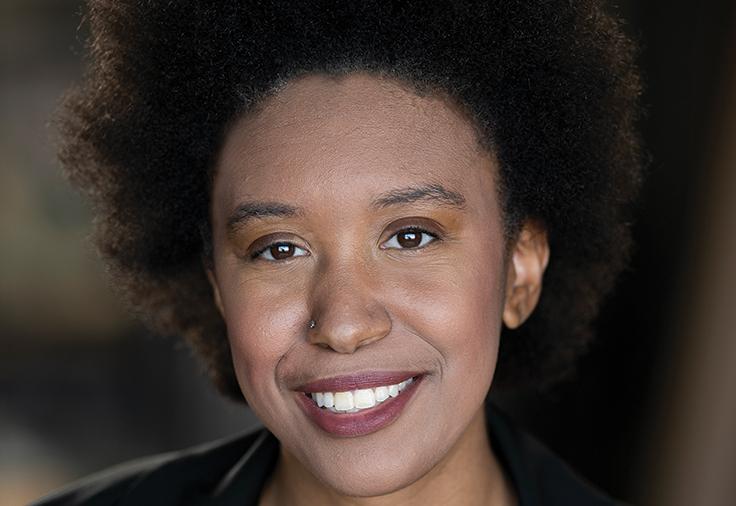
Khamal, a 19-year-old from Aurora, knows the inside of Colorado’s Division of Youth Services well. He’s been committed since he was 17.
He sits at a fold-up table with his case manager beside and lightly taps his foot. Khamal explains he’s out of juvenile detention, but not quite done.
“It feels good but I just wish I was not in the system at all,” he said. “That’s what I really miss, just my freedom.”
He’s had run-ins with the law for the past five years and entered Third Way Center, a program designed to get at-risk youth back on their feet, just over a year and a half ago. We’re just using his first name to protect his privacy.
There are 937 young people serving in the Colorado Division of Youth Services, as Khamal did. Once a teen is caught in the justice system, it’s difficult to leave. Almost half of all teens who leave the justice system in Colorado will return within 2 years, and more than half of all youths who have been in the justice system met the criteria for one or more psychiatric disorders and 20 percent have an anxiety disorder.
As part of CPR’s series Teens Under Stress, which investigates rising rates of mental health issues among teens, we followed Khamal for several months as he worked to put his life back together.
When Khamal was 14, his mother started having trouble finding and keeping work.
Eventually, she couldn’t pay rent. Several times, Khamal, his mother, and his siblings had to live out of their car.
Homelessness disproportionately affects low-income, LGBTQ and black or Hispanic non-white children. According to the Colorado Department of Education’s most recent numbers, 23,089 children in the state are experiencing homelessness. Teens who experience homelessness are more likely to end up in the justice system.
That’s what happened with Khamal. The same year his mom had trouble finding a job, Khamal was incarcerated for the first time for theft.
“Not having a roof over my head and waking up from a car and then going to school just didn’t feel right to me,” he said, “I felt like for me to have what I wanted, I had to take it. ”
While in the detention center, he often thought about simple freedoms he didn’t have anymore: seeing his mother every day, not waking up in a cell or asking permission to go to the bathroom. Khamal struggles with post-traumatic stress disorder, as well as impulsive thinking and memory loss.
Kristin Toombs, the director of the Office of the Homeless Initiatives at the Colorado Department of Local Affairs, says it’s common for children to experience trauma both in the events that lead to homelessness and during homelessness itself. That trauma can worsen health conditions and challenges the child already had.
“We also know that they are more likely to be involved in the justice system which further complicates securing employment, housing, self-sufficiency,” Toombs said.
Many minors who don’t have a house can find it difficult to attend and remain in school.
If you need help, dial 988 to reach the Suicide and Crisis Lifeline. You can also reach the Colorado Crisis Services hotline at 1-844-493-8255 or text “TALK” to 38255 to speak with a trained counselor or professional. Counselors are also available at walk-in locations or online to chat.
Khamal ended up in jail over and over again — four times in total.
By 17, he was fulltime in the juvenile justice system and couldn’t see a way out.
“I had nothing keeping me going,” he said.
Then, he found out he’d be a father.
“It changed a lot for me because I knew if I didn’t change, I couldn’t be there for my son,” he said.
Not long after, he left the detention center for the last time and entered Third Way. He was at one of its residential facilities when his son was born. He received a 48-hour pass to see the birth.
“When I first saw him, I honestly cried,” he said. “The number one thing in life is my son. My son comes first over everything. The reason I’m doing so well is my son.”
He began to progress more quickly. He transferred to Lincoln, the last house and phase of Third Way where he had more freedoms, like access to a cell phone and to jobs.
He still had to check in with a case manager regularly and turn in his cell phone at night.
Still, every once in a while, someone would find out about his record and they’d act differently towards him.
“It’s hard for me to talk about my charges,” Khamal said. “I used to be what my papers show but I’m not anymore.”
Legally, he does not have to disclose because his charges are juvenile offenses, but it was important for him to not be ashamed of his past.
As the end of his program loomed, Khamal struggled to figure out his path.
Khamal waited for weeks for his parole hearing. If granted, he would be able to get his own apartment.
First, the hearing got pushed back. Then, after he was able to leave Lincoln on parole, his application for an apartment was denied because his income wasn’t high enough and he couldn’t find a cosigner.
Then, he quit his job at Home Depot because it wasn’t giving him enough hours. He made the switch to ARC Thrift Stores doing donations, making $11.50 an hour full-time. That meant riding the bus for more than an hour to get to work and see his son.
“It’s tiring but it’s money,” he said.
One study found that after six months of reentering the community, less than half of returning juveniles were employed or in school. When they are employed, it’s less likely for these young people to have high-paying jobs, because they are likely to not have as much employment history or academic preparation compared to their peers who were not confined.
But eventually, it came together. He got his apartment and is seeing his son more.
Khamal’s dreaming of the future these days: He plans to go to college, maybe Colorado State University at Pueblo, and play football. He played for three high school teams before he stopped going to school.
The first picture of Khamal as a baby features him holding a football, and he dreams of going pro.
But if that can’t happen, he said he’d be happy being a coroner.
“When I was in school, biology was the only class I was actually attending,” Khamal said, laughing.
He’ll be able to get help on rent until he’s 23. Both the Division of Housing and Brothers Redevelopment will contribute to his rent.
He’s back looking for a job, but this time around, he said he didn’t feel the need to talk about his charges because he’s moved on. In the meantime, he is the primary caretaker while his son’s mother goes to work during the day.
“I wish that he has everything I didn’t have,” Khamal said. “I just don’t want him to want for anything, I want to make sure he has so he doesn’t feel like he has to go do what I did.”
He will be done with parole in August.










